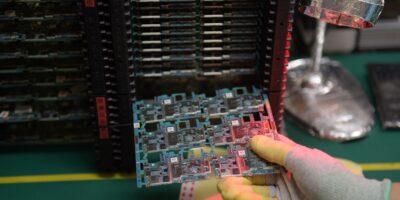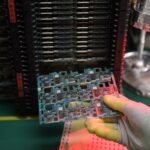
(Source – Shutterstock)
Chip output in Japan disrupted by industrial contamination
As the world continues to face a chip shortage crisis, any disruption to the supply chain is expected to cause more problems for companies around the world. Despite the numerous efforts taken by chip manufacturers to ensure chip output is not affected, some disruptions are just unavoidable.
The resurgence of the COVID-19 pandemic in China followed by heavy floods in Malaysia has already led to some delays in chip output towards the end of 2021. Factory closures for Lunar New Year celebrations in the last few weeks have also led to some companies having to rely on alternative routes for their chip supply chain.
Now, operations at two Japanese factories producing flash memory chips have been disrupted by the contamination of industrial materials. The latest disruption comes as the tech industry grapples with a global semiconductor shortage that has hampered the manufacturing of numerous products from cars to gaming consoles.
Chipmaker Kioxia suspected “contamination of materials used in the manufacturing processes” at its plants leading to operations being partially suspended, without giving further details. The company, a spin-off of Japanese conglomerate Toshiba, said it was working to restore full output at the factories in central and northern Japan as soon as possible.
Kioxia’s US-based partner Western Digital also confirmed the disruption and estimated it would cause “a reduction of flash availability of at least 6.5 exabytes” at the plants, which are run by the two companies as a joint venture. A unit of digital data, there are one billion gigabytes in an exabyte.
According to Hideki Yasuda, an analyst at Ace Research Institute, the disruption was more bad news for the industry.
“Flash memory prices will rise for sure, further adding fuel to the recent component price hike trend stemming from supply shortages,” he told Bloomberg News.
A Kioxia spokesperson said that only part of 3D Nand production has been hurt. The company will continue to ship from inventory in the short term but shipments will be curtailed in the “near term.”
A pandemic-fuelled surge in demand for home electronics that use semiconductors has throttled chip supplies — a crisis deepened by a cold snap in the United States, a drought in Taiwan, and fire at Japanese manufacturer Renesas last year.
While it is unsure how long the disruption will last, many organizations have already taken their own steps to deal with the chip shortage problem. Several firms have recently announced plans for new semiconductor plants as the chip squeeze continues.
In November 2021, Samsung said it will build a microchip factory in Texas, a $17 billion investment. Taiwan’s TSMC has said it will build a plant in Japan in partnership with Sony, while China’s biggest chipmaker said in September that it would build a new factory in Shanghai.
With additional reporting from © Agence France-Presse
READ MORE
- The criticality of endpoint management in cybersecurity and operations
- Ethical AI: The renewed importance of safeguarding data and customer privacy in Generative AI applications
- How Japan balances AI-driven opportunities with cybersecurity needs
- Deploying SASE: Benchmarking your approach
- Insurance everywhere all at once: the digital transformation of the APAC insurance industry


